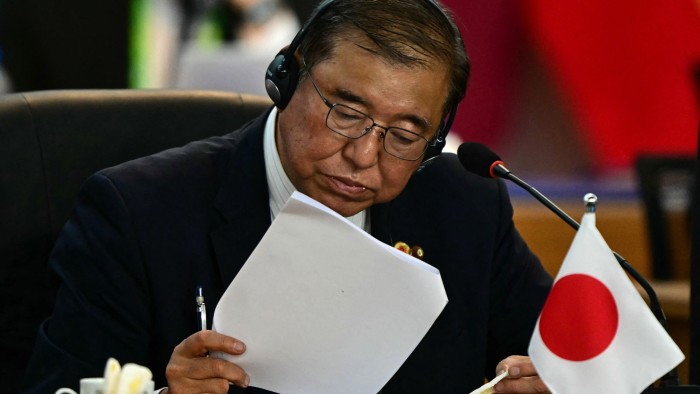Unlock the Editor’s Digest for free
Roula Khalaf, Editor of the FT, selects her favourite stories in this weekly newsletter.
Japan’s prime minister Shigeru Ishiba may be flailing as a politician and a diplomat, but as an investor he is a standout who has outperformed Japan’s stock benchmark in recent years.
Ishiba’s portfolio of individual stocks is up by about 102 per cent since the start of 2020, according to analysis by Nomura Securities, far exceeding the broader Topix, which is up 60 per cent over that period.
The prime minister has also outpaced all of the members of his cabinet, including the finance minister Katsunobu Kato, whose portfolio was up 83 per cent, and economy minister Yoji Muto, who was up 53 per cent.
Ishiba, who was narrowly re-elected as prime minister following a snap election, has battled low popularity and unflattering headlines, with the latest polls showing just 31 per cent approve of his cabinet. He was recently spotted falling asleep in parliament and missed a photo with other world leaders at the Apec summit in Brazil this month.
The prime minister, who is said to be obsessed with military equipment, holds seven stocks, including Mitsubishi Heavy Industries and Kawasaki Heavy Industries, two of Japan’s biggest defence contractors, which have soared since Japan nearly doubled its defence budget as a proportion of GDP last year.
His holdings also include Nippon Steel, which is embroiled in a heavily politicised, multibillion-dollar takeover bid for US Steel.
Nomura’s analysis followed the publication last week of the asset holdings by members of Ishiba’s cabinet. The disclosure requirement dates from the 1970s, when then-prime minister Kakuei Tanaka was arrested in a bribery scandal involving aerospace manufacturer Lockheed and several prominent Japanese companies.
Japanese cabinet ministers are banned from trading in equities, real estate and other assets while in office, and Nomura analysts found that the ministers’ portfolios remained roughly the same since 2020. They also compared Ishiba’s current portfolio to his 2016 disclosure, when he was last a cabinet minister, and found it largely unchanged.
The analysis found that, tracking average returns on equity portfolios since 2020, five cabinet ministers had outperformed the Topix, seven had underperformed and two had roughly tracked the benchmark. The analysis focused primarily on holdings of larger companies, and included stocks held by cabinet ministers’ spouses.
The most dismal stockpickers in the cabinet included the minister for health, labour and welfare, the arm of government ultimately responsible for the $1.45tn Government Pension Investment Fund, the world’s largest pool of retirement savings.
Nomura equity strategist Tomochika Kitaoka said that, given successive administrations’ efforts to encourage Japanese households to move their cash savings into risk assets, it was important for the cabinet to walk the walk as individual investors.
He noted that former prime minister Fumio Kishida, who announced his resignation in August, held no stocks at all.
However, Kitaoka said investors should not have “excessive expectations” about stocks owned by cabinet members, given the constraints on their trading activity.
An official in the prime minister’s office declined to comment on Ishiba’s stock portfolio, but noted that promoting Japan as an asset management centre was among the new administration’s policies.
Read the full article here

